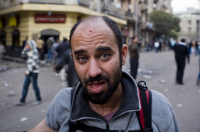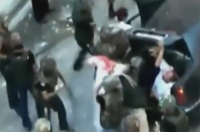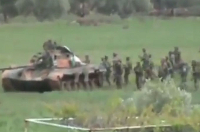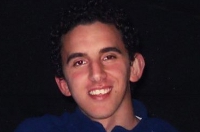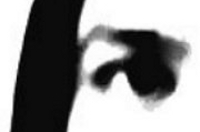Nasser Youssef
Alone at the capital’s first protest, a Bob Dylan fan commits to the uprising, then ends up in solitary confinement.
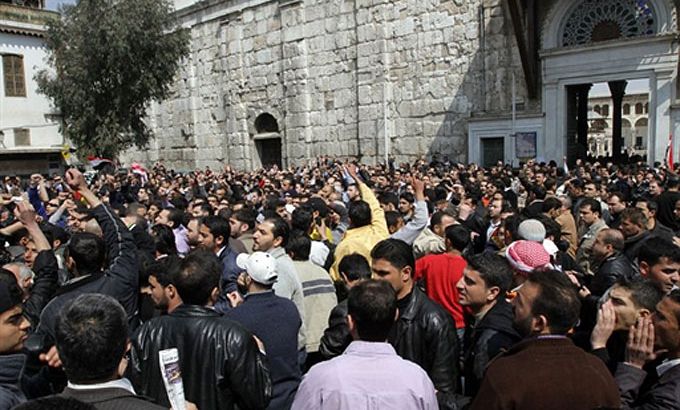
Nasser Youssef comes from Zabadani, in the hills of northwest Syria, around 50km from Damascus and close to the border with Lebanon. When he was born, in 1984, his grandfather was in prison for being a member of the Iraqi Ba’ath Party – since the 1960s a bitter rival to the Syrian Ba’athists of the ruling Assad family.
(Skip to the stories of others imprisoned in Syria.)
Youssef’s father passed away many years ago, while his mother is a philosophy teacher in a local secondary school. Youssef learned to despise the Assad regime like the rest of his relatives, but he was never interested in party politics. Nor did he find religion attractive; he says he doesn’t believe in God.
Instead, he watched US television shows like According to Jim and Bernie Mac, and he taught himself to play guitar and learned songs by the Beatles and Bob Dylan.
“To be honest with you, I tried to avoid talking about politics with everyone. I spent my whole time playing guitar,” Youssef said, during a recent internet phone call from his home. “I guess listening to the Beatles’ songs, and John Lennon’s songs, I think they were pretty impressive. ‘Revolution,’ ‘Imagine,’ his song ‘Imagine’ is so great, and Paul McCartney’s ‘Pipes of Peace’.”
When Youssef found a Facebook page called “Syrian Revolution 2011”, he decided to join.
“I think this is our only chance after the Tunisian and Egyptian revolutions, and I think if we didn’t take this chance, we will stay under the control of this regime for another 40 years,” he said.
Tentative first protest
By himself, feeling “desperate”, Youssef took a bus to Damascus on March 15, the day the Facebook page had called for protests. He arrived at the Umayyad Mosque, the chosen point for the demonstration, where Radwan would be arrested 11 days later. Only a dozen people had gathered, one of them a Zabadani man, Mohamed Ali, who Youssef befriended.
As they watched, two men staged a fight to attract attention, and the crowd swelled to around 40 people.
They marched through central Damascus, chanting “God, Syria, freedom, and that’s it.” When they neared Harika Square, just a few blocks from the capital’s main courthouse, they were swarmed by security officers. Youssef bolted down a side street and escaped into the crowd. He took a taxi back to Zabadani.
When he got home, he felt an enormous let down. He thought the protest had been a failure. In retrospect, March 15 marked the beginning of the uprising. Security forces locked down Damascus, but demonstrations spread.
A phone call from the security forces
Youssef began uploading videos to the Syrian Revolution Facebook page and translating news for its English and Italian versions. He didn’t try to hide. On May 5, he received a call from a security officer. The man wanted to have a conversation.
Youssef knew he would be caught eventually if he fled, so he turned himself in. They sent him back to Damascus, where they said he was wanted for questioning. He was transferred between branches of the internal security forces every few days, first State Security, then Political Security, and finally the Air Force Intelligence wing. He was beaten, sometimes with belts and electrified batons. In the State Security jail, from inside his cell, he could hear women cry out in pain.
In the custody of Political Security, Youssef claimed they held him for three days with dozens of other inmates in a cell that measured only 16 square metres. In the Air Force Intelligence facility, they kept him isolated in near total darkness for the first five days. When a guard entered, he was instructed to face a wall, keep his head down and hold his hands behind his back. If he wanted to use the bathroom, he had to strip naked.
Half the people he met in the Airforce Intelligence jail came from Deraa, the epicentre of the uprising, Youssef said.
His interrogators asked him about uploading videos and translating articles for the Facebook page. They asked if he had received money from Bandar bin Sultan – the Saudi prince and former ambassador to the United States who is now head of the national security council – or from Saad Hariri – the former prime minister of Lebanon whose father, also a prime minister, had been killed in a roadside bombing some attributed to Syria.
“They try to show us how beautiful it was before the demonstrations: ‘You can do whatever you want, but don’t talk about politics,'” Youssef said. “But no, that will not happen.”
Carefree comes to an end
On his 36th day in custody, Youssef was brought before a judge who told him he would would be released if he promised to never again participate in the uprising. He had Youssef’s file before him.
“He asked about papers the mukhabarat [intelligence] gave him, but he knows, every judge knows in a security branch you will speak everything or even wrong things because of torture and the beatings,” Youssef said.
But Youssef wanted to get out, so Youssef agreed. He told Al Jazeera that it was assumed the security forces release most of their inmates simply to make room for more.
Youssef had been in jail longer than anyone he knows.
“I am the Nelson Mandela of Zabadani,” he tells me, laughing.
Youssef is carefree when discussing his experience. He says he is happy to use his real name, and he has included a picture of himself and has listed his location on his online chat profile.
But six days later, he sends me an instant message. His cousin has been arrested at a checkpoint.
I ask him why he feels safe.
He types: “No, I’m not”
Does he still want to use his real name, I ask.
“I still think I’m in danger,” he writes. “Aha. Sorry. You can pick me any name you like.”
Four days later, I send him a message to check in. I don’t know it, but thousands of security forces have entered Zabadani, arresting around 500 people, according to activists.
“how is everything,” I type.
“[Youssef] is arrestd right now,” comes the response, using his real name. “i am his mom.”
She says her English is weak, so she begins to type in Arabic. Youssef discovered that the security forces were going to come to his home to arrest him. He decided to flee and told his brothers, ages 23 and 17, to come with him. The three left at around 5:00am, but as they approached a nearby orchard, they were surrounded by Political Security officers.
A friend who lives near the orchard told her what had happened. The brothers have been sent to Damascus.
She says she doesn’t know why he was arrested this time.
“just to keep us scared,” she writes.
I ask what she will be doing now. The reply is short.
“just crying. and waiting.”
